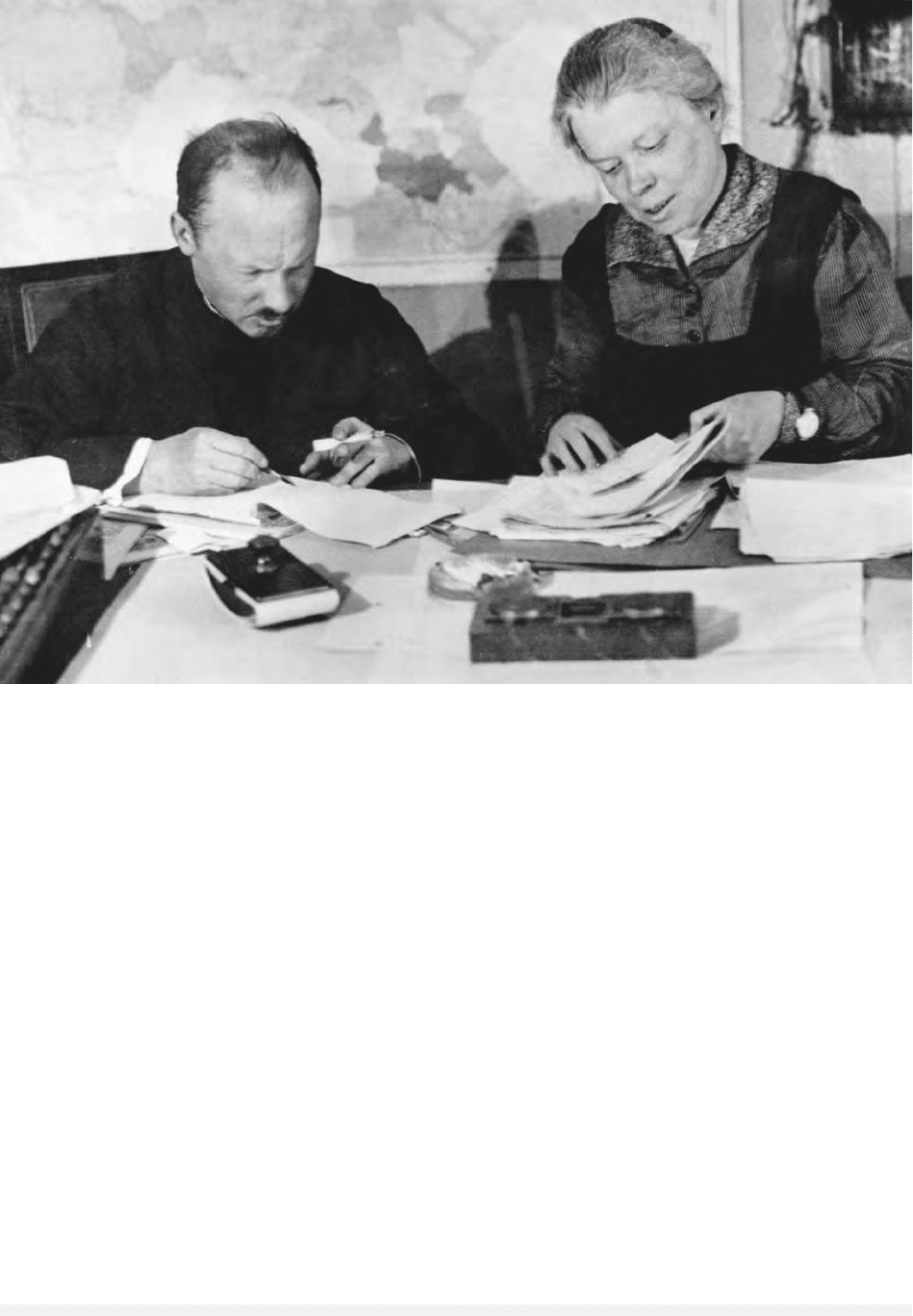Encyclopedia of Russian History
Подождите немного. Документ загружается.


During the eighteenth century, postal affairs
were in the hands of the Senate, but in 1809 they
were transferred to the jurisdiction of the Ministry
of Internal Affairs. In 1830 a Main Postal Admin-
istration was established as a separate government
organ, and it was superseded from 1865 to 1868
by a new Ministry of Post and Telegraph. After
1868 the postal system again became part of the
Ministry of Internal Affairs.
The turmoil of the Russian Revolutions and
Civil War greatly affected the postal system. Ser-
vices had to be reestablished gradually as outlying
areas were subdued by the Bolsheviks. At the cen-
ter, a new ministry, The People’s Commissariat of
Post and Telegraph (Narkompochtel) was estab-
lished, but it was not until the mid-1920s that ser-
vices were restored across the country. In 1924
the “circular-post” was set up, whereby horse-
drawn carts were used to distribute mail and sell
postal supplies along regular routes. Within a year,
the network had 4,279 routes with more than
43,000 stopping points, and it covered 275,000
kilometers (170,900 miles). Permanent village
postmen emerged in larger settlements as well in
1925, and they became responsible for home de-
livery when that aspect of the postal service was
created in 1930.
In 2002 the postal system was divided admin-
istratively into ninety-three regional postal depart-
ments with 40,000 offices and 300,000 employees.
However, since the collapse of the Soviet Union, the
postal system has declined dramatically. Letters
routinely take weeks to arrive, and a sizeable num-
ber of customers are beginning to bypass the postal
system in favor of private courier services. In or-
der to remain profitable, many post offices have
had to branch out into a wide array of services, in-
cluding offering Internet access or renting some of
their space to other retail outlets. The Russian gov-
ernment has also begun to consider the idea of
merging the regional departments into a single
joint-stock company to be called “Russian Post.”
See also: MINISTRY OF INTERNAL AFFAIRS
BIBLIOGRAPHY
Rowley, Alison. (2002). “Miniature Propaganda: Self-
Definition and Soviet Postage Stamps, 1917–1941.”
Slavonica 8:135–157.
Skipton, David, and Michalove, Peter. (1989). Postal Cen-
sorship in Imperial Russia. Urbana, IL: J. H. Otten.
A
LISON
R
OWLEY
POTEMKIN, GRIGORY ALEXANDROVICH
(1739–1791), prince, secret husband of Catherine
II, statesman, commander, imperial viceroy, eccen-
tric.
Grigory Potemkin’s life contains many mys-
teries. His year of birth and paternity are both dis-
puted. His father, Alexander Vasilievich Potemkin
(c. 1690–1746), an irascible retired army officer
from the Smolensk region, courted young Daria
Skuratova (1704–1780) while she was still mar-
ried. Grigory was the fifth born and sole male of
seven children. A Moscow cousin provided care for
the family after the father’s death. At school in
Moscow, Potemkin displayed remarkable aptitude
in classical and modern languages and Orthodox
theology. Clerical friends led him to consider a
church career. Potemkin entered the Horse Guards
while continuing school at age sixteen. In 1757 he
was one of a dozen students presented at court by
Ivan Shuvalov, curator of Moscow University. De-
spite a gold medal, his academic career ceased
with expulsion for laziness and truancy. He began
active service with the Guards in Petersburg, par-
ticipating in Catherine’s coup of July 1762, for
which he was promoted to chamber-gentleman and
granted six hundred serfs. Accidental loss of an
eye—mistakenly blamed on his patrons, the Orlov
brothers—lent mystique to his robust physique and
ebullient personality. He became assistant procura-
tor of the Holy Synod in 1763 and spokesman for
the non-Russian peoples at the Legislative Com-
mission of 1767–1768. On leave from court for ac-
tive army service in the Russo-Turkish War of
1768–1774, he fought with distinction under Field
Marshal Peter Rumyantsev from 1769 to Decem-
ber 1773. At Petersburg he dined at court in au-
tumn 1770, enhancing a reputation for devilish
intelligence and wit, hilarious impersonations, and
military exploits.
After Catherine’s break from Grigory Orlov in
1772–1773, she sought a fresh perspective amid
multiple crises. In December 1773 she invited
Potemkin to Petersburg to win her favor. Installa-
tion as official favorite swiftly followed. He sat
beside her at dinner and received infatuated notes
several times per day. He was made honorary sub-
colonel of the Preobrazhensky Guards, member of
the Imperial Council, vice-president (later president)
of the War Department, commander of all light
cavalry and irregular forces, and governor-general
of New Russia, and given many decorations capped
POTEMKIN, GRIGORY ALEXANDROVICH
1213
ENCYCLOPEDIA OF RUSSIAN HISTORY

by Catherine’s miniature portrait in diamonds—
only Grigory Orlov had another. Potemkin helped
to conclude the war on victorious terms, to over-
see the end of the Pugachev Revolt, and to craft leg-
islation strengthening provincial government against
renewed disorders.
Apparently the lovers arranged a secret wed-
ding in Petersburg on June 19, 1774. They spent
most of 1775 in Moscow to celebrate victories over
the Turks and Pugachev, ceremonies that Potemkin
choreographed. Catherine supposedly gave birth to
Potemkin’s daughter, Elizaveta Grigorevna Temk-
ina (a tale debunked in Simon Montefiore’s biog-
raphy). From early 1776, despite elevation to Prince
of the Holy Roman Empire, Potemkin drifted away
as a result of persistent quarrels over power and
rivals. In New Russia he supervised settlement and
arranged annexation of the Crimea, finally accom-
plished with minimal bloodshed in 1783 and re-
named the Tauride region. This was part of the
Greek Project that Potemkin and Catherine jointly
pursued in alliance with Austria and that foresaw
expulsion of the Turks from Europe and reconsti-
tution of the Byzantine Empire under Russian tute-
lage. The couple constantly corresponded about all
matters of policy and personal concerns, especially
hypochondria. She regretted his ailments however
petty, but when she fell into depression from fa-
vorite Alexander Lanskoi’s death in 1784, Potemkin
rushed back to direct her recovery. He planned the
flamboyant Tauride Tour of 1787 that took her to
Kiev, then by galley and ship to the Crimea, and
then back via Moscow. This inspired the myth of
“Potemkin villages,” a term synonymous with
phony display. He was awarded the surtitle of
Tavrichesky (“Tauride”) during the tour.
The Turks declared war in August 1787,
Potemkin taking supreme command of all Russian
forces in the south. He panicked for some weeks
when the new Black Sea fleet was scattered by
storms and Ottoman invasion threatened, but
Catherine kept faith in his military abilities, and
Potemkin led Russia to land and sea victories that
eventually won the war in 1792. He missed the fi-
nal victory, however, dying theatrically in the
steppe outside Jassy on October 16, 1791.
See also: CATHERINE II; PUGACHEV, EMELIAN IVANOVICH;
RUSSO-TURKISH WARS
BIBLIOGRAPHY
Alexander, John T. (1989). Catherine the Great: Life and
Legend. New York: Oxford University Press.
Madariaga, Isabel de. (1981). Russia in the Age of Cather-
ine the Great. New Haven: Yale University Press.
Montefiore, Simon Sebag. (2000). Prince of Princes: The
Life of Potemkin. London: Weidenfeld and Nicolson.
Raeff, Marc. (1972). “In the Imperial Manner.” In Cather-
ine the Great: A Profile, ed. Marc Raeff. New York:
Hill and Wang.
J
OHN
T. A
LEXANDER
POTEMKIN MUTINY
The Potemkin Mutiny that took place during the
1905 Russian Revolution on board of battleship
Knyaz Potemkin Tavricheskiy of the Russian Black
Sea Fleet on June 14–25, 1905.
The Potemkin, commissioned in 1902, was
commanded by Captain Golikov. On June 14, while
at sea on artillery maneuvers, its sailors protested
over the quality of meat that was brought on board
that day for their supper. The ship’s doctor in-
spected the meat and declared it fit for human con-
sumption.
The sailors, dissatisfied with this verdict, sent
a deputation, headed by Grigory Vakulenchuk, a
sailor and a member of the ship’s Social Democrat
organization, to Golikov. There was a confronta-
tion between the delegation and Commander
Gilyarovsky, the executive officer, who killed
Vakulenchuk. This sparked a revolt, during which
Golikov, Gilyarovsky, and other senior officers
were killed or thrown overboard. Afanasy Ma-
tushenko, a torpedo quartermaster and one of lead-
ers of the ship’s Social Democrats, took command.
On June 15, the Potemkin arrived at Odessa,
where the crew hoped to get support from strik-
ing workers. At 6
A
.
M
., the body of Vakulenchuk
was brought to the Odessa Steps, a staircase that
connected the port and the city. By 10
A
.
M
., some
five thousand Odessans gathered there in support
of the sailors. The gathering was peaceful through-
out the day, but toward evening there was rioting,
looting, and arson throughout the harbor front. By
9:30
P
.
M
., loyal troops occupied strategic posts in
the port and started firing into the crowd.
On June 16, authorities allowed the burial of
Vakulenchuk, but refused sailors’ demand for
amnesty. That day, the Potemkin shelled Odessa
with its six-inch guns. On June 17, mutiny broke
out on the battleship Georgi Pobedonosets and other
POTEMKIN MUTINY
1214
ENCYCLOPEDIA OF RUSSIAN HISTORY

ships of the Black Sea Fleet. However, by June 19
this mutiny was put down.
On June 18 the Potemkin set out from Odessa
to the Romanian port of Constanza, where sailors’
request for supplies was refused. The ship left the
port the following day, but returned on June 25,
after failing to secure supplies in Feodosia. The
sailors surrendered the ship to Romanian authori-
ties and were granted safe passage to the country’s
western borders.
The Potemkin mutiny was a spontaneous
event, which broke the plans by socialist organi-
zations in the Black Sea Fleet for a more organized
rebellion. However, it tapped into widespread dis-
affection on the part of the Russian people over
their conditions during the reign of Nicholas II. The
mutineers found sympathy among the people of
Odessa. While the mutiny was crushed, it, together
with other events in the 1905 Russian Revolution,
provided an important impetus to constitutional
reforms that marked the last years of the Russian
Empire.
See also: BLACK SEA FLEET; REVOLUTION OF 1905
BIBLIOGRAPHY
Ascher, Abraham. (1988). The Revolution of 1905. Stan-
ford, CA: Stanford University Press.
Hough, Richard. (1961). The Potemkin Mutiny. New York:
Pantheon Books.
Matushenko, Afansky. (2002). “The Revolt on the Ar-
moured Cruiser Potemkin.” <http://www.marxist
.com/History/potemkin.html>.
I
GOR
Y
EYKELIS
POTSDAM CONFERENCE
The Potsdam Conference was the last of the
wartime summits among the Big Three allied lead-
ers. It met from July 17 through August 2, 1945,
in Potsdam, a historic suburb of Berlin. Represent-
ing the United States, the Soviet Union and Great
Britain respectively were Harry Truman, Josef
Stalin and Winston Churchill (who was replaced
midway by Clement Atlee as a result of elections
that brought Labor to power). Germany had sur-
rendered in May; the war with Japan continued.
The purpose of the Potsdam meeting was the im-
plementation of the agreements reached at Yalta.
The atmosphere at Potsdam was often acrimo-
nious, presaging the imminent Cold War between
the Soviet Union and the West. In the months lead-
ing up to Potsdam, Stalin took an increasingly hard
line on issues regarding Soviet control in Eastern
Europe, provoking the new American president and
the British prime minister to harden their own
stance toward the Soviet leader.
Two issues were particularly contentious:
Poland’s western boundaries with Germany and
German reparations. When Soviet forces liberated
Polish territory, Stalin, without consulting his al-
lies, transferred to Polish administration all of the
German territories east of the Oder-Neisse (western
branch) Rivers. While Britain and the United States
were prepared to compensate Poland for its terri-
torial losses in the east, they were unwilling to
agree to such a substantial land transfer made uni-
laterally. They would have preferred the Oder-
Neisse (eastern branch) River boundary. The larger
territory gave Poland the historic city of Breslau
and the rich industrial area of Silesia. Reluctantly,
the British and Americans accepted Stalin’s fait ac-
compli, but with the proviso that the final bound-
ary demarcation would be determined by a German
peace treaty.
Reparations was another unresolved problem.
The Soviet Union demanded a sum viewed by the
Western powers as economically impossible. Aban-
doning the effort to agree on a specific sum, the
conferees agreed to take reparations from each
power’s zone of occupation. Stalin sought, with
only limited success, additional German resources
from the British and American zones. Agreements
reached at Potsdam provided for:
Transference of authority in Germany to the
military commanders in their respective
zones of occupation and to a four-power
Allied Control Council for matters affect-
ing Germany as a whole.
Creation of a Council of Foreign Ministers to
prepare peace treaties for Italy, Bulgaria,
Finland, Hungary, and Romania and ulti-
mately Germany.
Denazification, demilitarization, democratiza-
tion, and decentralization of Germany.
Transference of Koenigsberg and adjacent area
to the Soviet Union.
Just prior to the conference, Truman was in-
formed of the successful test of the atomic bomb
in New Mexico. On July 24 he gave a brief account
of the weapon to Stalin. Stalin reaffirmed his com-
mitment to declare war on Japan in mid-August.
POTSDAM CONFERENCE
1215
ENCYCLOPEDIA OF RUSSIAN HISTORY

While the conference was in session, the leaders of
Britain, China, and the United States issued a
proclamation offering Japan the choice between
immediate unconditional surrender or destruction.
Though the facade of allied unity was affirmed
in the final communiqué, the Potsdam Conference
marked the end of Europe’s wartime alliance.
See also: TEHERAN CONFERENCE; WORLD WAR II; YALTA
CONFERENCE
BIBLIOGRAPHY
Feis, Herbert. (1960). Between War and Peace: The Pots-
dam Conference. Princeton, NJ: Princeton University
Press.
Gormly, James L. (1990). From Potsdam to the Cold War:
Big Three Diplomacy, 1945–1947. Wilmington, DE: SR
Books.
McNeil, William H. (1953). America, Britain and Russia:
Their Cooperation and Conflict, 1941–1946. London:
Oxford University Press.
Wheeler-Bennett, John W., and Nicholls, Anthony.
(1972). The Semblance of Peace: The Political Settlement
after the Second World War. London: Macmillan.
J
OSEPH
L. N
OGEE
POZHARSKY, DMITRY MIKHAILOVICH
(1578–1642), military leader of the second national
liberation army of 1611–1612.
Prince Dmitry Mikhailovich Pozharsky be-
longed to the Starodub princes, a relatively minor
clan. He came to prominence as a military com-
mander during the reign of Vasily Shuisky. While
recovering from wounds sustained during service
in the first national liberation army of 1611,
Pozharsky was invited to lead the new militia,
which was being organized by Kuzma Minin at
Nizhny Novgorod. In March 1612 he led an army
from Nizhny to Yaroslavl, where he remained for
four months as head of a provisional government
that made military and political preparations for
the liberation of Moscow from the Poles. The cap-
ital was still besieged by Cossacks under Ivan
Zarutsky, who supported the claim to the throne
of tsarevich Ivan, the infant son of the Second False
Dmitry and Marina Mniszech; others, including
Prince Dmitry Trubetskoy, swore allegiance to a
Third False Dmitry who had appeared in Pskov.
Pozharsky himself, perhaps to neutralize the threat
from the Swedes who had occupied Novgorod,
seemed to favor the Swedish prince Charles Philip.
Pozharsky left Yaroslavl only after Zarutsky and
Trubetskoy had renounced their candidates for the
throne. Following Zarutsky’s flight from the en-
campments surrounding Moscow, Pozharsky and
Trubetskoy liberated the capital in October 1612
and headed the provisional government, which con-
vened the Assembly of the Land that elected Michael
Romanov as tsar in January 1613. Pozharsky was
made a boyar on the day of Michael’s coronation,
and he performed a number of relatively minor mil-
itary and administrative roles during Michael’s reign.
Along with Minin, Pozharsky was subsequently re-
garded as a national hero and served as a patriotic
inspiration in later wars.
See also: ASSEMBLY OF THE LAND; COSSACKS; MININ,
KUZMA; ROMANOV, MIKHAIL FYODOROVICH; TIME OF
TROUBLES
BIBLIOGRAPHY
Dunning, Chester L. (2001). Russia’s First Civil War: The
Time of Troubles and the Founding of the Romanov Dy-
nasty. University Park: Pennsylvania State Univer-
sity Press.
Perrie, Maureen. (2002). Pretenders and Popular Monar-
chism in Early Modern Russia: The False Tsars of the
Time of Troubles, paperback ed. Cambridge, UK: Cam-
bridge University Press.
Skrynnikov, Ruslan G. (1988). The Time of Troubles: Rus-
sia in Crisis, 1604–1618, ed. and tr. Hugh F. Gra-
ham. Gulf Breeze, FL: Academic International Press.
M
AUREEN
P
ERRIE
PRAVDA
Pravda (the name means “truth” in Russian) was
first issued on May 5, 1912, in St. Petersburg by
the Bolshevik faction of the Russian Social Demo-
cratic Party. Its aim was to publicize labor activism
and expose working conditions in Russian facto-
ries. The editors published many letters and arti-
cles from ordinary workers, their primary target
audience at the time.
Pravda was a legal daily newspaper subject to
postpublication censorship by the tsarist authori-
ties. These authorities had the power to fine the
paper, withdraw its publication license, confiscate
a specific issue, or jail the editor. They closed the
POZHARSKY, DMITRY MIKHAILOVICH
1216
ENCYCLOPEDIA OF RUSSIAN HISTORY

paper eight times in the first two years of its exis-
tence, and each time the Bolsheviks reopened it un-
der another name (“Worker’s Truth,” etc.). In spite
of police harassment the newspaper maintained an
average circulation of about forty thousand in the
period 1912 to 1914, probably a higher number
than other socialist papers (but small compared to
the commercial “penny newspapers”). About one-
half of Pravda’s circulation was distributed in St.
Petersburg. After the authorities closed the paper
on July 21, 1914, it did not appear again until af-
ter the February Revolution of 1917.
Pravda reopened on March 5, 1917, and pub-
lished continuously until closed down by Russian
Republic president Boris Yeltsin on August 22,
1991. From December 1917 until the summer of
1928 the newspaper was run by editor in chief
Nikolai Bukarin and Maria Ilichna Ulyanova,
Lenin’s sister. When Bukharin broke with Josef
Stalin over collectivization, Stalin used the Pravda
party organization to undermine his authority.
Bukharin and his supporters, including Ulyanova,
were formally removed from the editorial staff in
1929. By 1933 the newspaper, now headed by Lev
Mekhlis, was Stalin’s mouthpiece.
Throughout the Soviet era access to Pravda was
a necessity for party members. The paper’s primary
role was not to entertain, inform, or instruct
the Soviet population as a whole, but to deliver
Central Committee instructions and messages to
Soviet communist cadres, foreign governments,
and foreign communist parties. Thus, as party
membership shifted, so did Pravda’s presentation.
In response to the influx of young working-class
men into the Party in the 1920s, for example, ed-
itors simplified the paper’s language and resorted
to the sort of journalism that they believed would
appeal to this audience—militant slogans, tales of
PRAVDA
1217
ENCYCLOPEDIA OF RUSSIAN HISTORY
Nikolai Bukharin and Maria Ulyanova, sister of Lenin, at work at the Communist Party newspaper,
Pravda.
© H
ULTON
-D
EUTSCH
C
OLLECTION
/CORBIS

heroic feats of production, and denunciation of
class enemies.
Pravda also produced reports on popular moods.
This practice began in the early 1920s as Bukharin
and Ulianova played a leading role in organizing
the worker and peasant correspondents’ movement
in the Soviet republics. Workers and peasants
(many of them Party activists) wrote into the
newspaper with reports on daily life, often shaped
by the editors’ instructions. Newspapers, including
Pravda, received and processed millions of such let-
ters throughout Soviet history. Editors published a
few of these, forwarded some to prosecutorial or-
gans, and used others to produce the summaries of
popular moods, which were sent to Party leaders.
After the collapse of the USSR nationalist and
communist journalists intermittently published a
print newspaper and an online newspaper under
the name Pravda. However, the new publications
were not official organs of the revived Communist
Party.
See also: JOURNALISM; NEWSPAPERS
BIBLIOGRAPHY
Brooks, Jeffrey (2000). Thank You, Comrade Stalin! Soviet
Culture from Revolution to Cold War. Princeton, NJ:
Princeton University Press.
Kenez, Peter (1985). The Birth of the Propaganda State: So-
viet Methods of Mass Mobilization, 1917–1929. New
York: Cambridge University Press.
Lenoe, Matthew. (1998). “Agitation, Propaganda, and the
‘Stalinization’ of the Soviet Press, 1922–1930.” Pitts-
burgh, PA: Carl Beck Papers in Russian and East Eu-
ropean Studies, no. 1305.
Roxburgh, Angus (1987). Pravda: Inside the Soviet News
Machine. New York: George Brazillier.
M
ATTHEW
E. L
ENOE
PREOBRAZHENSKY GUARDS
The Preobrazhensky Regiment and its slightly ju-
nior counterpart, the Semenovsky Life Guard Reg-
iment, trace their histories to 1683, when Peter the
Great as tsarevich created two “play regiments.”
Named after villages near Moscow, the regiments
initially consisted of Peter’s boyhood cronies and
miscellaneous recruits who engaged in war games
in and around the mock fortress of Pressburg. The
regiments attained formal status in 1687, followed
in 1700 by official appellation as Guards. More
than guarantors of the tsar’s physical security,
these regiments served as models for the emergence
of a standing regular Russian army. With adjust-
ments, Peter structured them on the pattern of Eu-
ropean-style units that Tsar Alexis Mikhailovich
had first introduced into Russian service. As they
evolved, the guards became officer training schools
for an assortment of gentry youths and foreigners
who remained reliably close to the throne. In set-
ting the example, the tsar himself advanced
through the ranks of the Preobrazhensky Regi-
ment, serving notably in 1709 as a battalion com-
mander at Poltava. Non-military missions for
guards officers and non-commissioned officers of-
ten extended to service as a kind of political police
for the sovereign. By 1722, Peter’s guards (with
cavalry) numbered about three thousand troops,
and his Table of Ranks recognized their elite status
by according their complement two-rank seniority
over comparable grades in the regular army.
During the half-century after Peter’s death, a
mixture of tradition, proximity to the throne, elite
status, and gentry recruitment propelled the Preo-
brazhensky Regiment into court politics. Every
sovereign after Peter automatically became chief
of the regiment; therefore, appearance of the ruler
in its uniform symbolized authority, continuity,
and mutual acceptance. Meanwhile, because Peter
had made gentry service mandatory, noble fami-
lies often registered their male children at birth on
the regimental list, thus assuring early ascent
through the junior grades before actual duty. In ef-
fect, the Guards became a bastion of gentry inter-
ests and sentiment, and various parties at court
eventually drew the Preobrazhensky Regiment into
a series of palace intrigues and coups. Officers of
the regiment played conspicuous roles in the palace
coups of 1740 and 1741 that overthrew successive
regents for the infant Ivan VI in final favor of Em-
press Elizabeth Petrovna. Members of the regiment
displayed an even higher profile during the coup of
July 1762 that deposed Peter III in favor of his Ger-
man-born wife, who became Empress Catherine II.
She counted prominent supporters within the
regiment, and she pointedly dressed as a Preo-
brazhensky colonel during the campaign on the
outskirts of the capital to arrest her husband. On
re-entry into St. Petersburg, Catherine personally
rode at the head of the regiment. Yet, whatever the
level of guards’ participation in this and previous
coups, there was never any genuine impulse to cre-
ate an alternative military government; solicitous
PREOBRAZHENSKY GUARDS
1218
ENCYCLOPEDIA OF RUSSIAN HISTORY

attention from the traditional monarchy seemed
adequate recompense for guards’ conspiratorial
complicity.
The onset of Catherine II’s reign marked the
zenith of the Preobrazhensky’s role as power bro-
ker, although association with the regiment con-
tinued to retain symbolic significance. To forestall
repetition of events, a new generation of military
administrators increasingly recruited non-noble
subjects with outstanding physical characteristics
as rank-and-file guards, while Tsar Paul I subse-
quently diluted the guards with recruits from his
Gatchina corps. Moreover, other sources of officer
recruitment, including the cadet corps, soon sup-
planted the guards. Only in 1825, during the De-
cembrist revolt, when a Preobrazhensky company
was the first unit to side with Tsar Nicholas I, was
there more than brief allusion to a political past.
Subsequently, the Preobrazhensky Regiment re-
mained the bearer of a proud combat tradition that
included distinguished service in nearly all of im-
perial Russia’s wars. The sons of illustrious fami-
lies vied for appointment to its officer cadre, while
the tsars continued to wear its distinctive dark
green tunic on ceremonial occasions.
See also: CATHERINE II; MILITARY, IMPERIAL ERA; PETER I
BIBLIOGRAPHY
Alexander, John T. (1989). Catherine the Great: Life and
Legend. New York: Oxford University Press.
Keep, John. L. H. (1985). Soldiers of the Tsar: Army and
Society in Russia, 1462–1874. Oxford: Clarendon
Press.
B
RUCE
W. M
ENNING
PREOBRAZHENSKY, YEVGENY
ALEXEYEVICH
(1886–1937), Russian revolutionary, oppositionist,
and Marxist theorist.
Born in Bolkhov, Orel province, Yevgeny Pre-
obrazhensky began his political activism at age fif-
teen as a Social Democrat and later became a
Bolshevik and a regional leader. Together with
Nikolai Bukharin, Preobrazhensky led the Left
Communist opposition to the Brest-Litovsk Treaty
with Germany (1918). In 1920 he became one of
three secretaries of the Bolshevik Party, together
with Nikolai Krestinsky and Leonid Serebryakov,
all later active in the Trotskyist Opposition. The
three were removed from these posts in 1922, when
Josef Stalin was made General Secretary of the
Party Central Committee.
In 1923 Preobrazhensky authored the “Plat-
form of the Forty-Six,” which attacked the grow-
ing bureaucratization and authoritarianism of the
Party apparatus. Also in 1923 he published On
Morality and Class Norms, in which he attacked the
apparatus’s growing privileges. From this point
Preobrazhensky became a close ally of Leon Trot-
sky and a leader of the various Trotskyist opposi-
tions. Following the suppression of the 1927 Joint
Opposition, he was expelled from the Party in
1928, but in 1929 became one of the first Trot-
skyists to recant his views and return to the Party
fold. He was arrested in 1935 and testified against
Grigory Zinoviev and Lev Kamenev at the first
Moscow show trial in 1936. He was scheduled to
be a defendant in the second trial in 1937, but re-
fused to confess and was shot in secret in that same
year. He was rehabilitated during Gorbachev’s per-
estroika.
Preobrazhensky was a major theorist and one
of the Soviet Union’s leading economists of the
1920s. He opposed Stalin’s and Bukharin’s policy
of “Socialism in One Country” and the slow pace
of industrialization. In his major work, The New
Economics, he put forward the theory of primary
socialist accumulation, in which he argued that
successful industrial development had to extract re-
sources from the peasant economy. However, he
resolutely opposed the use of force to achieve this,
and by 1927 had concluded that only a revolution
in the advanced countries of Western Europe could
save the Soviet Union from a political and economic
impasse. While he purported to welcome Stalin’s
solution to this dilemma (forced collectivization and
industrialization), in 1932 he published his second
theoretical masterpiece, The Decline of Capitalism.
This was a serious analysis in its own right of the
Great Depression, but it contained a less-than-veiled
attack on Stalin’s five-year plans and the policy of
developing heavy industry at the expense of con-
sumption.
See also: BUKHARIN, NIKOLAI IVANOVICH; STALIN, JOSEF
VISSARIONOVICH; TROTSKY, LEON DAVIDOVICH
BIBLIOGRAPHY
Day, Richard B. (1981). The “Crisis” and the “Crash”: So-
viet Studies of the West (1917–1939). London: NLB.
PREOBRAZHENSKY, YEVGENY ALEXEYEVICH
1219
ENCYCLOPEDIA OF RUSSIAN HISTORY

Erlich, Alexander. (1960). The Soviet Industrialization De-
bate. Cambridge, MA: Harvard University Press.
Preobrazhensky, E. A. (1965). The New Economics. Ox-
ford: Clarendon.
Preobrazhensky, E. A. (1973). From NEP to Socialism.
London: New Park.
Preobrazhensky, E. A. (1980). The Crisis of Soviet Indus-
trialization, ed. Donald A. Filtzer. London: Macmil-
lan.
Preobrazhensky, E. A. (1985). The Decline of Capitalism,
ed. Richard B. Day. Armonk, NY: M. E. Sharpe.
D
ONALD
F
ILTZER
PRESIDENCY
The presidency is the most powerful formal polit-
ical institution in post-communist Russia. Except
for the ceremonial title given to the head of the
USSR Supreme Soviet, the Soviet Union did not
have a presidency until its waning years, although
the adoption of one was discussed under Josef
Stalin and again under Nikita Khrushchev. New
proposals resurfaced in the late 1980s, prompting
intense debate among Communist Party elites
about the efficacy of introducing an institution that
could challenge the party’s authority. Despite con-
cerns about the concentration of power in the
hands of a single individual, the Supreme Soviet
and the Congress of People’s Deputies approved the
Soviet presidency in 1990. The first presidential
election was to be held by the legislature, with sub-
sequent popular elections. Mikhail Gorbachev be-
came president in March 1990, receiving 71 percent
of the votes in the Congress of People’s Deputies.
The union republics began electing presidents
before the dissolution of the USSR. In June 1991,
Boris Yeltsin was chosen as Russia’s first president
in an election that pitted him against five competi-
tors. In his first term, following the breakup of the
USSR, Yeltsin faced a recalcitrant parliament that
opposed many of his initiatives. The conflict be-
tween the executive and legislative branches cul-
minated in Yeltsin’s issuing a decree that dissolved
parliament on September 21, 1993. Parliament re-
jected the decree and declared Vice President Alexan-
der Rutskoi to be acting president. The forces
opposing Yeltsin assembled armed supporters, oc-
cupied the Russian White House, and attempted to
take control of the main television network. Pro-
Yeltsin forces attacked the White House and crushed
the parliamentary rebellion in early October 1993.
The constitutional crisis led to the formal
strengthening of the presidency, codified in the 1993
constitution. Rather than a pure presidential system,
the Russian Federation adopted a semi-presidential
system in which the president is the popularly
elected head of state, and the prime minister, nom-
inated by the president, is the head of government.
The president is elected to a four-year term using a
majority-runoff system that requires a majority
vote to win in the first round of competition. If no
candidate gains a majority, a runoff is held between
the top two candidates from the first round. The
president wields substantial formal powers and thus
has more authority than the leaders in parliamen-
tary and many other semipresidential systems.
Among other things, the president can veto laws,
make decrees, initiate legislation, call for referenda,
and suspend local laws that contravene the consti-
tution. The president is limited to two consecutive
terms in office.
Yeltsin was reelected president in July 1996, af-
ter defeating the candidate of the Communist Party
of the Russian Federation, Gennady Zyuganov, in
the second round of competition. Yeltsin resigned
from the presidency on December 31, 1999. Vladi-
mir Putin served briefly as acting president and then
was elected in March 2000. Putin reasserted presi-
dential authority, strengthening central control
over the regions, challenging powerful business in-
terests, and extending control over the press.
See also: CONSTITUTION OF 1993; GORBACHEV, MIKHAIL
SERGEYEVICH; PUTIN, VLADIMIR VLADIMIROVICH;
YELTSIN, BORIS NIKOLAYEVICH
BIBLIOGRAPHY
Huskey, Eugene. (1999). Presidential Power in Russia. Ar-
monk, NY: M. E. Sharpe.
Nichols, Thomas M. (2001). The Russian Presidency. New
York: St. Martin’s.
E
RIK
S. H
ERRON
PRESIDENTIAL COUNCIL
In March 1990, when the Communist Party of
the Soviet Union lost its political monopoly and
Mikhail Gorbachev was elected president of the
PRESIDENCY
1220
ENCYCLOPEDIA OF RUSSIAN HISTORY

USSR, he created a new Presidential Council to re-
place the Politburo as the major policy-making
body in the Soviet Union. The council’s task, ac-
cording to the newly revised Soviet constitution,
was to determine the USSR’s foreign and domestic
policy. This was a major institutional innovation.
The Presidential Council was to be independent of
the Communist Party, which at this stage was
viewed as incapable of reform, and was intended to
challenge the power of the Defense Council (subse-
quently abolished) and to increase and reinforce
Gorbachev’s new presidential power. Gorbachev’s
choice of members to compose the Council was
very controversial. The sixteen members, only five
of whom were Politburo members, included Chin-
giz Aitmatov, a Kyrghiz writer; Vadim Bakatin,
minister of the interior; Valery Boldin, head of the
Central Committee General Department; KGB chief
Vladimir Kryuchkov; Anatoly Lukyanov, chair of
the Supreme Soviet; Yuri Maslyukov, chairman of
the state planning commission; Yevgeny Primakov,
chairman of the Soviet of the Union; Valentin
Rasputin, the nationalist writer and only non-
communist; Prime Minister Nikolay Ryzhkov;
Stanislav Shatalin, economist; Eduard Shevard-
nadze, the foreign minister; Alexander Yakovlev, a
senior secretary of the Central Committee and min-
ister without portfolio; Venyamin Yarin, leader of
the United Workers Front; and Marshal Dmitry
Yazov, minister of defense. Depending upon which
source one consults, the council also included two
of the following: Yuri Osipian, physicist; Georgy
Revenkov, chair of the Council of the Union of the
Supreme Soviet; and Vadim Medvedev. The coun-
cil experiment did not work because the members
could not act collectively and the council’s policies
were rarely put into practice. As a result, making
the necessary changes in the Soviet constitution,
Gorbachev abolished the Presidential Council in No-
vember 1990. The council was resurrected several
times during the presidency of Boris Yeltsin but
had no clearly defined functions and little political
clout.
See also: GORBACHEV, MIKHAIL SERGEYEVICH; POLITBURO;
PRESIDENCY
BIBLIOGRAPHY
Brown, Archie. (1996). The Gorbachev Factor. Oxford: Ox-
ford University Press.
Gill, Graeme. (1994). The Collapse of a Single-Party Sys-
tem: The Disintegration of the Communist Party of the
Soviet Union. Cambridge, UK: Cambridge University
Press.
Sakwa, Richard. (1990). Gorbachev and His Reforms,
1985–1990. New York: Philip Allan.
C
HRISTOPHER
W
ILLIAMS
PRESIDIUM OF SUPREME SOVIET
The Russian word soviet means “council.” The
Supreme Soviet beginning in 1936 was the pre-
1991 equivalent of the Parliament or Congress in
democratic countries. It consisted of two chambers.
The upper chamber (the Council of Nationalities)
consisted of representatives (“people’s deputies”) of
the hundred-plus nationalities of the USSR; the
lower chamber (the Council of the Union) repre-
sented the population at large on a per-capita rep-
resentative basis. Initially they were elected for
four-year terms, then, beginning in 1977, for five-
year terms. There were eleven convocations (fol-
lowing eleven elections) of the Supreme Soviet
between December 12, 1937, and March 26, 1989,
which met in eighty-nine sessions. The Supreme
Soviet met for only a few days semiannually to
vote unanimously for the government’s (in reality,
the Communist Party’s) program. It elected the Pre-
sidium, which was a standing body that had more
functions; as well as nominally formed the gov-
ernment, including the Council of Ministers of the
USSR; chose the procurator general (chief prosecu-
tor, equals attorney general) of the USSR; and ap-
pointed the Supreme Court of the USSR.
The Brezhnev Constitution of 1977 converted
the Supreme Soviet into a fuller legislative and con-
trol organ elected by the Congress of the Council
of Nationalities and Council of the Union. The
Supreme Soviet itself appointed the Council of Min-
isters, the Control Commission, the chief prosecu-
tor, and chose the Presidium from among its
members.
In 1989 the old Supreme Soviet was converted
into the Congress of People’s Deputies of the USSR,
a standing body with 2,250 deputies, one-third
elected from equal territories, one-third from na-
tionality regions, and one-third from social orga-
nizations. Five such congresses met between 1989
and 1991. From its members it chose by secret bal-
lot a new Supreme Soviet, in accord with a law of
December 1, 1988, which was subordinate to it.
The new Supreme Soviet had the same two cham-
bers as before with 266 deputies in each.
PRESIDIUM OF SUPREME SOVIET
1221
ENCYCLOPEDIA OF RUSSIAN HISTORY

The heads of the Presidium were the nominal
heads of state of the Soviet Union: Mikhail Ivano-
vich Kalinin (1938–1946), Nikolai Mikhailovich
Shvernik (1946–1953), Kliment Efremovich Voroshi-
lov (1953–1960), Leonid Ilich Brezhnev (1960–1964
and 1977–1982), Anastas Ivanovich Mikoyan (1964–
1965), Nikolai Viktorovich Podgorny (1965–1977),
Yuri Vladimirovich Andropov (1983–1984), Kon-
stantin Ustinovich Chernenko (1984–1985), Andrei
Andreyevich Gromyko (1985–1988), and Mikhail
Sergeyevich Gorbachev (1988–1989). Most of them
were figureheads, for power actually lay in the Com-
munist Party, and the state authorities were its rub-
ber stamps. However, when Brezhnev in 1977
decided to combine the jobs of head of the Commu-
nist Party of the Soviet Union (CPSU) and of the
USSR (followed in this by Andropov, Chernenko,
and Gorbachev), the heads of the Presidium were the
most important figures in the Soviet Union. The Pre-
sidium also had the office of first assistant to the
head, but this office was so insignificant that it was
not created until 1944, and then was not appointed
from 1946 to 1977.
The men who made the Presidium work were
its secretaries: A. F. Gorkin (1938–1953 and
1956–1957), N. M. Pegov (1953–1956), M. P.
Georgadze (1957–1982), and T. N. Menteshashvili
(1982–1989).
To the extent that the Soviet service state (q.v.)
functioned efficiently or not, the Presidium secre-
taries deserve much of the credit or blame. They
embodied the meritocratic principles of the service
state and the last two, as Georgians, personified the
multinational nature of the Soviet empire.
Occasionally the plenum of the Central Com-
mittee of the CPSU, the Council of Ministers of the
USSR, and the Presidium of the Supreme Soviet of
the USSR met together, as happened on March 5,
1953, from 10 to 10:40
P
.
M
., when they adopted
resolutions on governmental organization after
Stalin’s death.
The Supreme Soviets met only a few days an-
nually, and its Presidium carried on its business in
the intervals. (The two organs paralleled the Com-
munist Party’s All-Union Congresses and the Polit-
buro. In theory, the CPSU made policy; the
government carried it out.) According to Article
119 of the 1977 Constitution, the Presidium had
thirty-seven members. The chairman was nomi-
nally in charge; then there were fifteen vice-chairs,
one for each republic, who were present more for
decoration than for work. Then there was the sec-
retary, the workhorse of the Presidium, and twenty
others who had area responsibilities corresponding
to the ministries that ran the USSR. The presidium
had a long list of functions, only some of which
can be mentioned here. It set the dates for the elec-
tion of the Supreme Soviet and convened its ses-
sions. It was responsible for the government
observing the Constitution and that all laws were
constitutional. It had the task of interpreting the
laws when dispute arose. The Presidium instituted
and awarded orders and medals, including military
ones. It ruled on matters of citizenship. It formed
the Council of Defense and appointed and dismissed
the leaders of the armed forces. It was the body
that could proclaim martial law, declare war and
peace, and order the mobilization of the armed
forces. It ratified foreign treaties and dealt with
diplomatic matters. Article 121 of the Constitution
authorized the Presidium to create and disband gov-
ernmental ministries and to appoint and fire min-
isters.
See also: CONGRESS OF PEOPLE’S DEPUTIES; CONSTITUTION
OF 1977; COUNCIL OF MINISTERS, SOVIET; SUPREME
SOVIET
BIBLIOGRAPHY
Kudriavtsev, V. N., et al., eds. (1986). The Soviet Consti-
tution. A Dictionary. Moscow: Progress.
R
ICHARD
H
ELLIE
PRIKAZY See CHANCELLERY SYSTEM.
PRIKAZY
1222
ENCYCLOPEDIA OF RUSSIAN HISTORY
Table 1.
Individual
Dates in Office
Mikhail I. Kalinin 1938-1946
Nikolai M. Shvernik 1946-1953
Klimentii E. Voroshilov 1953-1960
Leonid I. Brezhnev 1960-1964
Anastas I. Mikoian 1964-1965
Nikolai V. Podgornyi 1965-1977
Leonid I. Brezhnev 1977-1982
Iurii V. Andropov 1983-1984
Konstantin U. Chernenko 1984-1985
Andrei A. Gromyko 1985-1988
Mikhail S. Gorbachev 1988-1989
SOURCE: Courtesy of the author.
Presidium of the Supreme Soviet
